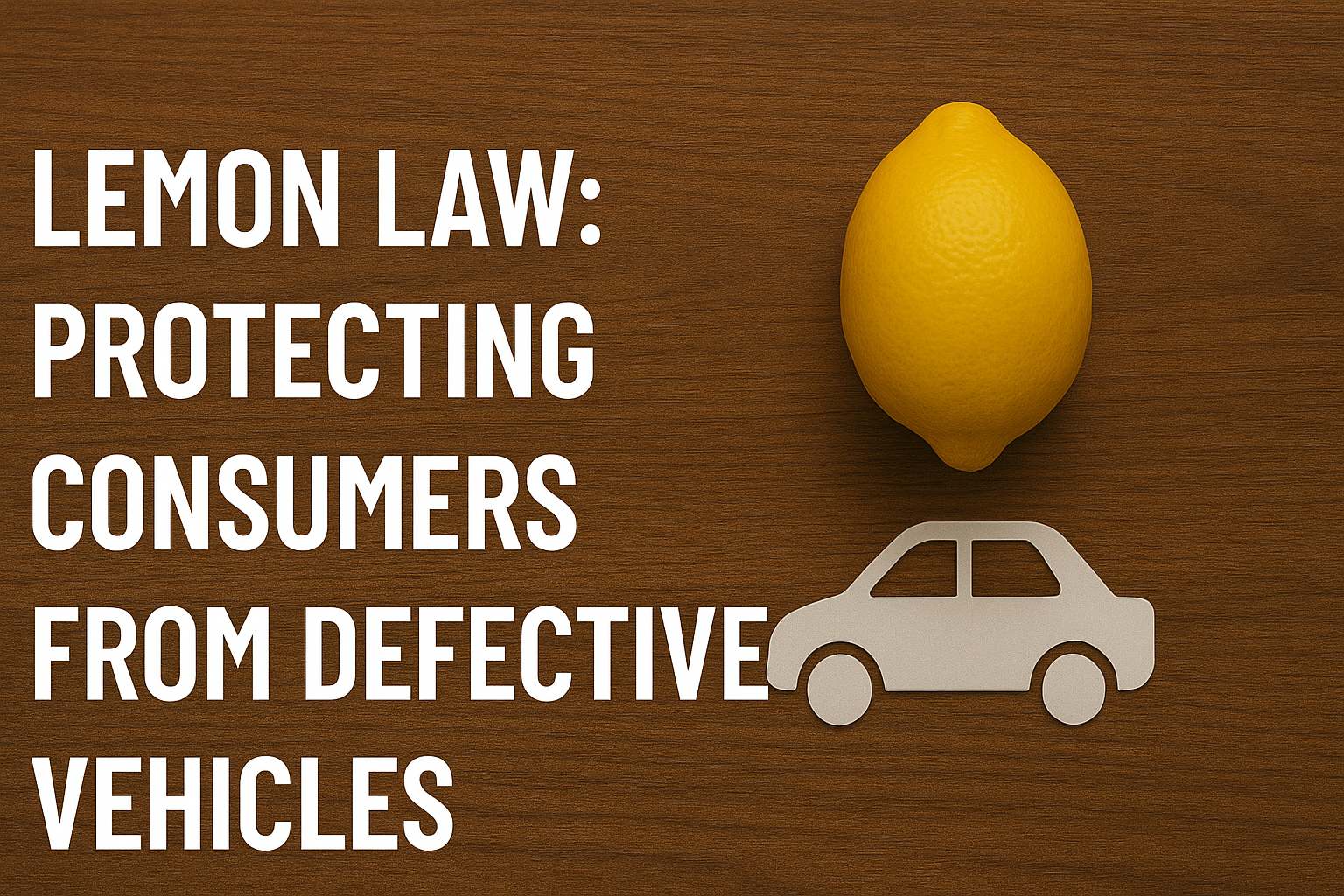On this page you will read detailed information about Lemon Law.
As a consumer, you expect your new vehicle to function properly and safely. Unfortunately, some cars leave the lot with serious defects that persist despite multiple repair attempts. This is where lemon laws come to your rescue. These crucial consumer protection statutes provide recourse when you’ve purchased a defective vehicle. Understanding your rights under lemon laws can save you significant time, money, and frustration. In this article, you’ll learn the key elements of lemon laws, how they safeguard your interests as a buyer, and the steps you can take if you suspect you’ve purchased a “lemon.” Empower yourself with the knowledge to navigate these important consumer protections.
Understanding Lemon Law: What Are They?
Lemon law are consumer protection statutes designed to safeguard individuals who have purchased or leased defective vehicles. These laws exist at both the federal and state levels, providing recourse for consumers stuck with problematic automobiles, often referred to as “lemons.”
Federal Lemon Law Protection
The cornerstone of federal lemon law protection is the Magnuson-Moss Warranty Act of 1975. This legislation covers products sold with warranties, including vehicles. It requires manufacturers and sellers to provide clear information about warranty coverage and allows consumers to seek refunds or replacements if a product fails to conform to the warranty after reasonable repair attempts.
State-Specific Lemon Laws
While federal law provides a baseline, each state has its own lemon laws with varying specifics. These laws typically apply to new vehicles, though some states extend limited protection to used cars as well. Common features include:
- Coverage for defects that significantly impair the vehicle’s use, value, or safety
- A specified number of repair attempts or days out of service before a vehicle is considered a lemon
- Options for refunds, replacements, or additional damages
Consumer Rights and Remedies
Under lemon laws, consumers have the right to have their vehicle repaired, replaced, or refunded if it meets the criteria of a “lemon.” To navigate the process effectively, consumers should:
- Document all defects and repair attempts
- Understand their state’s specific lemon laws
- Consider consulting with a lemon law attorney for expert guidance
By understanding lemon laws, consumers can protect themselves from the financial burden and frustration of defective vehicles.
Qualifying for Lemon Law Protection
Understanding the Basics of Lemon Laws
Lemon laws exist in all 50 states and the District of Columbia to protect consumers who purchase or lease defective vehicles. While specific requirements vary by state, there are some common criteria for qualifying under these consumer protection statutes.
Key Criteria for Lemon Law Eligibility
To qualify for lemon law protection, your vehicle must typically meet the following conditions:
- Have a substantial defect that impairs its use, value, or safety
- The defect must occur within a certain time or mileage period (usually 1-2 years or 12,000-24,000 miles)
- The manufacturer must be given a reasonable number of attempts to repair the issue
According to the National Lemon Law Center, qualifying defects are significant problems like faulty brakes or transmission issues, not minor cosmetic flaws.
The Repair Process
Most states require that the manufacturer be given a “reasonable number” of repair attempts before a vehicle can be declared a lemon. This often means:
- At least 3 repair attempts for the same issue, or
- The vehicle being out of service for 15 or more business days
In Massachusetts, for example, consumers must also give manufacturers a final 7-day opportunity to fix the defect after the initial repair attempts.
If these criteria are met and the issue persists, you may be eligible for a refund or replacement vehicle under your state’s lemon laws.
In the previous post, we had shared information about Family Law in Australia: A Comprehensive Overview, so read that post also.
Navigating the Lemon Law Claims Process
Identifying a Lemon and Gathering Evidence
The first step in navigating Lemon Laws is determining if your vehicle qualifies. A “lemon” typically has substantial defects covered by warranty that impair its use, value, or safety after multiple unsuccessful repair attempts. To build a strong case, meticulously document all issues, repair attempts, and communications with the manufacturer. Keep detailed records including repair invoices, service orders, and correspondence.
Filing Your Claim
Once you’ve established your vehicle as a potential lemon, notify the manufacturer in writing about the defect and your intention to seek a remedy under Lemon Laws. Many states require this formal notification before proceeding. Next, file a complaint with your state’s consumer protection agency or pursue arbitration if mandated. If these steps don’t yield results, you may need to file a lawsuit.
Seeking Legal Assistance
Navigating Lemon Laws can be complex, so consulting with a specialized attorney is highly recommended. They can evaluate your case, guide you through the process, and advocate on your behalf to maximize your chances of a favorable outcome. Many Lemon Law attorneys work on a contingency basis, meaning you only pay if you win your case.
Remedies and Compensation Under Lemon Laws
Vehicle Buyback or Replacement
Under Lemon Laws, consumers who purchase defective vehicles have two primary remedies. The first is a vehicle buyback, where the manufacturer repurchases the defective vehicle for the original price, including taxes, registration fees, and incidental expenses. The second option is a replacement vehicle of similar value and features. Both remedies aim to make the consumer whole after dealing with a problematic purchase.
Cash Settlements and Additional Compensation
In some cases, consumers may opt for a “cash and keep” settlement, allowing them to retain the vehicle while receiving monetary compensation for its diminished value. This can be particularly beneficial when vehicle inventory is low or prices have increased. Additionally, Lemon Laws often provide for incidental and consequential damages, covering costs like lost wages or alternative transportation expenses.
Civil Penalties and Legal Fees
If a manufacturer is found to have willfully violated Lemon Laws, consumers may be entitled to civil penalties of up to twice the amount of actual damages. Furthermore, these laws typically allow for the recovery of attorney’s fees and legal costs, making it easier for consumers to pursue their claims without financial burden. While it’s possible to file a Lemon Law claim independently, working with an experienced attorney can significantly improve the chances of a favorable outcome.
Lemon Law FAQs: Your Top Questions Answered
Under Lemon Laws, a vehicle is generally considered a “lemon” if it has a substantial defect covered by warranty that cannot be fixed after a reasonable number of repair attempts. According to California law, this typically means 4 or more repair attempts for the same issue, 2 or more attempts for a safety-related problem, or if the vehicle has been out of service for repairs for 30+ days. However, specific criteria can vary by state.
If your vehicle qualifies as a lemon, you may be entitled to significant remedies. The Lemon Law typically requires manufacturers to provide either a full refund or a replacement vehicle. This can include reimbursement for your down payment, monthly payments, registration fees, and even incidental expenses like rental cars or towing costs.
While Lemon Laws primarily cover new vehicles, there are some exceptions. Many state laws also protect consumers who purchase used cars still under the manufacturer’s warranty. Additionally, the federal Magnuson-Moss Warranty Act can extend coverage to other vehicles like boats, RVs, and ATVs. It’s important to consult with a Lemon Law expert to understand your specific rights and options.
Conclusion
As you navigate the complex world of vehicle ownership, understanding your rights under lemon laws is crucial. These consumer protection statutes offer recourse if you find yourself with a persistently defective vehicle. By familiarizing yourself with your state’s specific lemon law provisions, maintaining detailed records, and following proper procedures, you can effectively advocate for yourself should the need arise. Remember, lemon laws exist to safeguard your significant investment and ensure manufacturers are held accountable. While no one wants to invoke these protections, knowing they exist provides peace of mind as you drive off the lot in your new vehicle. Stay informed, stay protected, and enjoy the open road with confidence.
Disclaimer
The information and services on this website are not intended to and shall not be used as legal advice. You should consult a Legal Professional for any legal or solicited advice. While we have good faith and our own independent research to every information listed on the website and do our best to ensure that the data provided is accurate. However, we do not guarantee the information provided is accurate and make no representation or warranty of any kind, express or implied, regarding the accuracy, adequacy, validity, reliability, availability, or completeness of any information on the Site. UNDER NO CIRCUMSTANCES SHALL WE HAVE ANY LIABILITY TO YOU FOR ANY LOSS OR DAMAGE OF ANY KIND INCURRED AS A RESULT OR RELIANCE ON ANY INFORMATION PROVIDED ON THE SITE. YOUR USE OF THE SITE AND YOUR RELIANCE ON ANY INFORMATION ON THE SITE IS SOLELY AT YOUR OWN RISK. Comments on this website are the sole responsibility of their writers so the accuracy, completeness, veracity, honesty, factuality and politeness of comments are not guaranteed.
So friends, today we talked about Lemon Law, hope you liked our post.
If you liked the information about Lemon Law, then definitely share this article with your friends.








